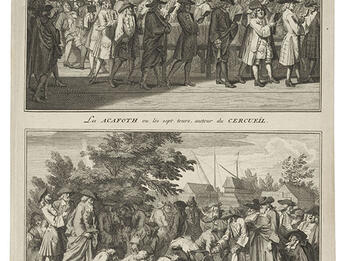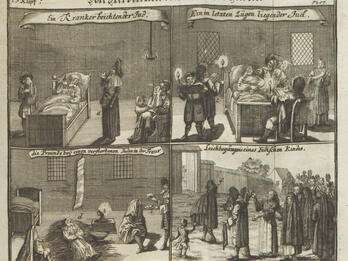Shevet musar (Rod of Correction): On Contemplating Death
Chapter 15
The enlightened will awaken, and he who understands will rise up to waken his soul, which will speak to his body; and his body will speak with his evil inclination.
And thus, the soul will say to the body, “My body, do you not know that the lining of your bed in the grave will be maggots, and your covering will be a covering of worms? Do you not know that under your head will be a clump of earth? [ . . . ] And from your ribs you mine tablets for the dwelling of vipers, and your throat is a passageway for cobras, and your ears are channels for mosquitoes, and your mouth is a gatehouse for all of the reptiles of the earth. And from your veins and sinews you make ropes to drag you to the pit of the nether region and to the miry clay [see Psalms 40:3]. And why do you make your fingernails as hatchets with which to cut down the trees of the forest, in order to prepare them for your burning in hell? Your hands are knives with which to puncture your rusty transgressions, and your fingers are stakes with which to split your stomach so that it discharges the excrement of your sins. From there will be burned the vessels of your waste, which you increased with the great feeding of the pleasures of your whoredom. Why do you prepare your tongue to be an arrow, which is shot at you to pierce your kidneys? Why do you not have pity on it, and why do you not have mercy on your image and likeness [to God]?”
The soul will say and declare all this to the diseased body, and the body will say as follows to its inclination, “What is it to you, my inclination, to persecute me, and why do you think of me as an enemy? Know that your glory will not be known and made famous by the way in which you proceed to fight against me, as you are a burning fire, and I am a stormy husk that is thrashed at all times. Does the fire pride itself in consuming the husk and the thatch? You are a very strong evil wind, and I am smoke that rises from the chimney and does not return. Should one praise the strong wind that scatters smoke? You are a sea storming with anger and wrath, and I am the shell of a walnut or an almond—within which there is a nut—a worthless entity. Should the stormy sea boast that it has sunk a small shell? You are a wheel made entirely out of iron, with no wood, and I am thin and dry dust. Should the wheel of iron boast that it has broken up dry dust? You are a sharp axe, and I am rotted wood, branch and root together. Should the axe boast that it has carved wood that has been consumed by the moth? You are a strong hammer that breaks apart stones, and I am as soft as truffles and mushrooms. Should one praise the hammer that breaks apart truffles? You are armed with every type of armament, and I am weak and bare, and in my hands there is nothing. Should he who is armed boast that he has defeated the bare and the weak? You are a serpent that kills, and I am a fluttering dove. Should the serpent boast that it has bitten the weak dove? You are a roaring, pacing lion, and I am a young, passing goat. Should one praise the lion that preys upon the young goat? You are an enraged, taloned eagle, and I am a small, feeble bird. Should the eagle who kills the weak and broken bird boast? You are a malicious king, and I am poor, a pauper. It is a disgrace for the king to be angry over such an indigent fellow. You are an angry, enraged old man, and I am a passing child. And is it suitable for an old man full of knowledge to set himself to speak with a baby whose brain is soft like a squash. You should not even speak with older people, since they will ultimately be eaten by worms. Therefore, my inclination, even though you have hated me, I have loved giving you advice so that you should avoid shame and humiliation from every side. This is like the advice the kingdom of women gave Alexander the Great when he went to fight with them. They said to him: ‘If you defeat us, what glory will you attain by defeating women? But if we defeat you, then for the rest of time, you will have no name among the kings.’ He listened to their advice and refrained from fighting with them. You too, my inclination, should think about this and refrain from fighting with me, for you will not gain anything by fighting me. For if you defeat me, you will have nothing to boast about in defeating a husk, smoke, a thin shell, rotten wood, thin dust, one who is bare, weak, and poor. But if I defeat you, then you will be covered in shame and you clothed in humiliation. And do not be assured that the weak will not kill the mighty.” [ . . . ]
Chapter 21
The Day of Death and the Day of Burial
Place, O man, the following idea before your eyes: imagine that your time has come, and you are dead and lying on the ground, in the middle of the house. Imagine that your wife and your children, and the members of your household, and all of your loved ones and your friends are sitting alongside you and surrounding you with organized lamentations and a weeping voice that embitters those who hear it. And your soul is hovering above your body and going from your head to your feet, and from your feet it looks for a spot by which to reenter your body, but it cannot do so. It mourns and is silent and paralyzed, like a woman who is wrapped in black for the companion of her youth, who goes from the house to the attic, and from the attic to the house, in order to see the places in which it was accustomed to sit when it dwelt within the body. From there it travels to the place of its treasure chest and the garments of its beauty. And it is full of sorrow, and worries as to how it will be comforted, when it is naked, and its body has been torn from it and is left lying naked, without clothing, like a stone that cannot be overturned [see b. Sanhedrin 14a]. And also imagine vividly that they have come to wash the body with cold water, and they are no longer concerned about it getting cold, and they clothe it in a shroud alone, and he is free from all of the toils and travails with which he struggled during its lifetime, and all the rest of his precious garments and his money is now ready and prepared for his wife’s husband. And imagine that they had placed the body in a casket and it is carried on the shoulders of men who bring it out of his house, never to return. And when the man’s wife and his children cry out after him with a wailing voice, he does not turn his face to them and does not respond to them, as he was accustomed to do in his lifetime when he would leave his house, and his wife and children would ask him to bring delightful things and various kinds of food upon his return; he would respond positively to every single request. And now, he goes out silently. They go down with him all the way to the grave and cover him with dirt upon his face; and they cannot save him. They cry, “My father! My father!” and they receive no response, until they despair of him, and return to their house with hands that are empty of him. He remains alone in his grave, in the heat of the day and the cold of the night [see Genesis 31:40]; he shall be for briers and thorns (Isaiah 7:23). And in the twilight, in the evening (Proverbs 7:9), young lions [the angels of destruction] will cry out over him.
There is nowhere to escape, and there is no small corner in which to be saved. And the forlorn soul climbs up and down, over the body that is in its grave, thinking that perhaps it can enter into it. It makes this effort for up to three days. Upon seeing its stomach split open, it despairs of the body and goes home, and from the home to the grave, for up to seven days. And upon seeing that there is no hope, it flies away into the expanse of the world, in order to seek a place of rest and to find serenity for itself; it seeks to ascend above, but it finds a dividing screen and a wall of steel that it had made with its transgressions, which it cannot pass. The angels of destruction encounter it, rebuff it and push it from one to the other, inflicting terror and in fear, and with great punishments, according to its wickedness. At the end of the seven days of mourning, his children and his wife go to visit his grave, and it is all covered with dry thorns and brambles, and the border of the stones of his grave is destroyed. His wife cries loudly to him, thinking that perhaps he will answer her, and his children touch his grave weeping, thinking that perhaps he will feel; there is no sound, and no response. They conclude that if he could speak, he would answer them, “Return (faithless) children (Jeremiah 3:22), for I am never going to return to you. You will not see me again; my face has turned to dust, and all of my bones have separated from each other. They retain no form and no body and no image of a body.” The children immediately return to their homes and leave him there. He busies himself with his judgment and accounting, and the sentence of his soul, and they busy themselves with the ways of life: with feasts and with delicacies, and excursions and buildings, and marriages of children with melodies, happiness, and joy.
Behold, one should always imagine this before his eyes and thereby subjugate his inclination. If it is of stone, it will be smashed, and if it is of iron, it will be shattered [see b. Kiddushin 30b]. Our rabbis of blessed memory included all of this in one saying [b. Berakhot 5a]: “A man will always incite his good inclination over his bad inclination, etc.,” until “he should remember the day of his death.” Hinted at here is that he should remember and place before his eyes everything that will come to him on the day of his death until his burial, as mentioned. Thus, it does not say “he should remember his death,” which implies only that he should remember that he will die. For from this alone, he will not work so hard to subjugate his evil inclination. On the other hand, if he remembers and places before his eyes all that will be done to him on the day of his death according to this imagining, then perhaps he will work to subjugate this inclination, which is as hard as iron and is a tirelessly oppressive enemy.
And behold, I order before you, O man, a wonderful and terrible order, and it is a way toward confession and supplication and request, with which to come before the creator of all. And how good and how pleasant it would be for this to become the routine for every man, that is, for this to be said always. For it improves the soul in several ways and earns it pardon and absolution, and also the praise and adoration of the God who performs fearsome acts. When my eyes see, they shall see correctly, and the lip of truth shall be established forever (Proverbs 12:19).
Credits
Published in: The Posen Library of Jewish Culture and Civilization, vol. 5.





